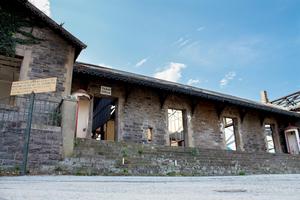Part three
A few hundred metres from the Alicedale train station stands the Doctor’s House, home to the local medical practitioner since 1820.
Part three
A few hundred metres from the Alicedale train station stands the Doctor’s House, home to the local medical practitioner since 1820.
Dr Rudi Marx, now a general practitioner in Grahamstown, has fond memories of the station, serving what he fondly calls “the railway people” as the Alicedale station doctor for three years from 1969.
“All the station masters and conductors and people who lived there – I would be responsible for them,” he proudly says.
“And even the wheel-tappers and cleaners who cleaned the station.”
The doctor would also treat any sick passengers, laughing as he remembered the various patients he treated over the years.
These included countless Grahamstown school-goers who would “stuff their faces on the last day of school” and then have a stomach ache and be vomiting by the time they reached him in Alicedale.
Another common injury was passengers who would stick their heads out of the window of the train, only to have tiny splinters jam into their eyes which he would have to remove.
Marx also boasts delivering a number of babies during his time as the station’s doctor.
“I could write a book about all my experiences on the trains,” he said.
Marx became more acquainted with the local station after moving his family to Grahamstown in 1972. He frequently used the train here as well.
“It was lovely. We loved the train. My wife and I would go to Johannesburg by train,” he recalls, remembering another time he left the station with his entire family when they went all the way to Cape Town.
That train trip to the Cape was particularly memorable for Marx’s wife, and more especially, one of their sons.
The doctor recalls how his wife put their three sons to sleep in the bunk beds of the overnight train, accompanying family friends who also tucked away their three daughters who were sharing the same compartment.
The adults then shared a few drinks, chatting well into the evening as the train trudged along through the Garden Route.
Before settling down for the night themselves, the two mothers went to check on their children to ensure they were sound asleep.
To their horror, they noticed that the middle bunk, that of the Marxs’ five-year-old son Gunter, was empty.
‘He must be in the bathroom,’ they thought as they scurried down to the lavatories at the end of the carriage.
Not finding her son there, Mrs Marx began to worry, thinking the toddler might have easily opened the wrong door on the train and possibly fallen overboard.
The conductor was then summoned and asked to stop the train as a frantic search ensued.
Each compartment was searched in the hope that Gunter had mistakenly returned to the wrong one.
When the search proved fruitless, Mrs Marx returned to her children’s compartment to wake up her other sons and ask them if they knew where Gunter was.
“Peter, do you know where Gunter is?” the eldest son was asked.
“No,” came a sleepy response.
The same was asked of Dominic, the youngest son, but they were met with the same reply.
The girls sleeping on the bunks opposite were then also awakened, to see if they knew the whereabouts of the boy.
Kelly, who was the same age as Gunter, was woken up.
“Kelly, do you know where Gunter is?”
“Yes,” she said.
“Where is he?”
“He’s sleeping in my sleeping bag,” came an innocent reply, revealing how the youngster had felt cold and asked to share a bed with his friend.
Thirty-five years later, Kelly and Gunter tied the knot, and have been happily married for the past five years.
“At five years old they were already sleeping together!” Marx chuckled.
Yet the doctor’s face quickly changes demeanour, into an almost crestfallen look, as he grieves the loss of the railway system today. 
“We miss them, we miss them.
“They’ve got a special sound,” he says, recalling how the trains initially woke him up at night.
But he soon became accustomed to its unique and almost re-assuring hum. A hum that locals have not heard in years.
Blue sky and clouds can be seen from the stripped door- and window-frames of the derelict Grahamstown Station. Photo: Cameron Easton


